Related Research Articles
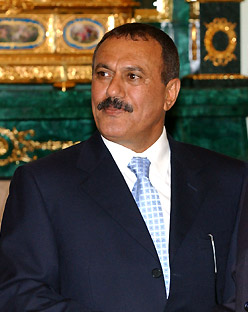
Ali Abdullah Saleh al-Ahmar was a Yemeni politician who served as the first President of Yemen, from Yemeni unification on 22 May 1990 to his resignation on 25 February 2012, following the Yemeni Revolution. Previously, he had served as President of the Yemen Arab Republic, or North Yemen, from July 1978 to 22 May 1990, after the assassination of President Ahmad al-Ghashmi.

The president of the Republic of Yemen is the head of state of Yemen. Under the Constitution of Yemen, the president is also the Supreme Commander of the Armed Forces and head of the executive branch of the Yemeni government.
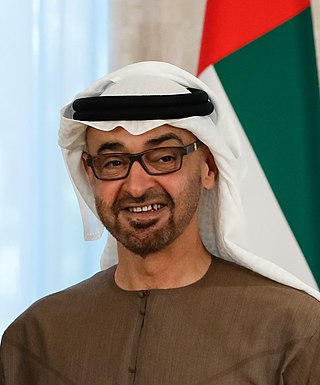
Sheikh Mohamed bin Zayed Al Nahyan, colloquially known by his initials as MBZ, is the third president of the United Arab Emirates and the ruler of Abu Dhabi.

Mohamed Hussein Tantawi Soliman was an Egyptian field marshal and politician. He was the commander-in-chief of the Egyptian Armed Forces and, as chairman of the Supreme Council of the Armed Forces, was the de facto head of state from the ousting of President Hosni Mubarak on 11 February 2011 until the inauguration of Mohamed Morsi as president of Egypt on 30 June 2012. Tantawi served in the government as Minister of Defense and Military Production from 1991 until Morsi ordered him to retire on 12 August 2012.
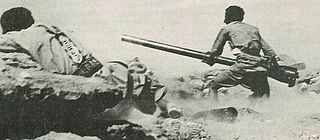
The North Yemen Civil War was fought in North Yemen from 1962 to 1970 between partisans of the Mutawakkilite Kingdom and supporters of the Yemen Arab Republic. The war began with a coup d'état carried out in 1962 by revolutionary republicans led by the army under the command of Abdullah as-Sallal, who dethroned the newly crowned Imam Muhammad al-Badr and declared Yemen a republic under his presidency. The Imam escaped to the Saudi Arabian border where he rallied popular support from northern Shia tribes to retake power, escalating rapidly to a full-scale civil war.

North Yemen competed as the Yemen Arab Republic at the 1988 Summer Olympics in Seoul, South Korea. After unification with South Yemen, the nation would return as Yemen at the 1992 Summer Olympics.

The Central Bank of Yemen is the central bank of Yemen.
On August 13, 2009, Egyptians captured by Somali pirates and held hostage for ransom attacked their captors, using whatever was at their disposal before seizing weapons from the pirates. They managed to overpower their captors and reach Aden, Yemen, in what was described a "daring and dramatic escape."

Abdrabbuh Mansur Hadi is a Yemeni politician and former field marshal of the Yemeni Armed Forces who served as the president of Yemen from 2012 until 2022, when he stepped down and transferred executive authority to the Presidential Leadership Council, with Rashad al-Alimi as its chairman. He was the vice president to Ali Abdullah Saleh from 1994 to 2012.
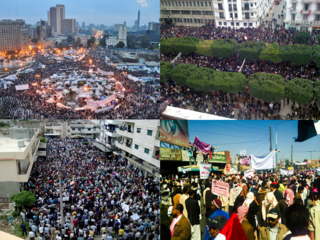
The Arab Spring was a series of anti-government protests, uprisings and armed rebellions that spread across much of the Arab world in the early 2010s. It began in Tunisia in response to corruption and economic stagnation. From Tunisia, the protests then spread to five other countries: Libya, Egypt, Yemen, Syria and Bahrain. Rulers were deposed or major uprisings and social violence occurred including riots, civil wars, or insurgencies. Sustained street demonstrations took place in Morocco, Iraq, Algeria, Lebanon, Jordan, Kuwait, Oman and Sudan. Minor protests took place in Djibouti, Mauritania, Palestine, Saudi Arabia and the Moroccan-occupied Western Sahara. A major slogan of the demonstrators in the Arab world is ash-shaʻb yurīd isqāṭ an-niẓām!.

The Yemeni Revolution (intifada), also known as the Yemeni Revolution of Dignity followed the initial stages of the Tunisian Revolution and occurred simultaneously with the Egyptian Revolution of 2011 and other Arab Spring protests in the Middle East and North Africa. In its early phase, protests in Yemen were initially against unemployment, economic conditions and corruption, as well as against the government's proposals to modify Yemen's constitution. The protesters' demands then escalated to calls for the resignation of Yemeni President Ali Abdullah Saleh. Mass defections from the military, as well as from Saleh's government, effectively rendered much of the country outside of the government's control, and protesters vowed to defy its authority.

Somalia–Yemen relations are bilateral relations between Somalia and Yemen. Both members of the Arab League, the two countries formally established diplomatic ties on December 18, 1960.

The siege of Dammaj started in October 2011 when the Houthis, a Zaydi-led rebel group which controls the Sa'dah Governorate, accused Salafis loyal to the Yemeni government of smuggling weapons into their religious center in the town of Dammaj and demanded they hand over their weapons and military posts in the town. As the Salafis refused, Houthi rebels responded by imposing a siege on Dammaj, closing the main entrances leading to the town. The town was controlled by the Houthis and the fighting was mainly centered at Dar al-Hadith religious school, which is run by Salafis, although its founder imam Muqbil bin Hadi al-Wadi'i rejected Osama bin Laden in the 1990s. The Salafis from Dammaj and its Dar al-Hadith imam Sheikh Yahya al-Hajuri claimed that they are totally against al-Qaeda and all that they stand for.

The Vice President of the Republic of Yemen is the second highest political position in Yemen.
Nagor Amir Noor Mohamed is an international association football referee from Malaysia. He became a FIFA referee in 2011.
In Yemen, popular committees are armed groups formed by Yemeni tribes on behalf of more professional armed forces.

Tareq Mohammed Abdullah Saleh is a Yemeni military commander and the nephew of the late President Ali Abdullah Saleh. His father was Major General Mohammed Abdullah Saleh. Prior to the national crisis beginning in 2011, he headed the elite Presidential Guard. In 2012, he was ordered to stand down from this position but re-emerged as a commander in the Houthi-Saleh alliance when the Yemeni Civil War broke out in 2015. When this alliance collapsed in 2017, Tareq Saleh commanded troops loyal to his uncle. Prior to the collapse of the pro-Saleh forces, the Saudi-owned Al Arabiya reported that negotiations were ongoing to form a military council in Saleh-held areas, which would have been headed by Tareq. Following his uncle's death, reports emerged that the younger Saleh had also been killed. However, these were never confirmed, and Houthi forces launched a manhunt. Saleh evaded capture, and eventually resurfaced in the Hadi loyalist-held governorate of Shabwah.
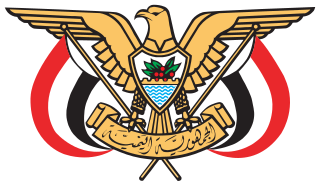
The Ministry of Justice is a cabinet ministry of Yemen.

The Ministry of Information is a cabinet ministry of Yemen.
References
- ↑ Sudam, Mohamed (20 March 2011). "Yemen's U.N. envoy quits over violence to protesters". Reuters. Retrieved 11 July 2015.